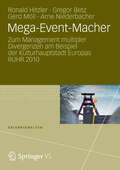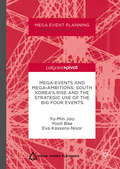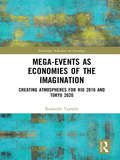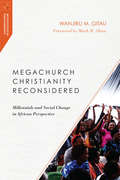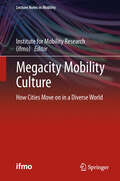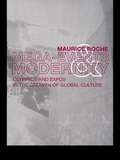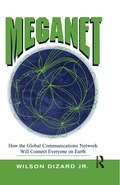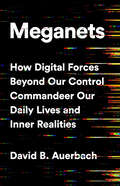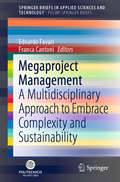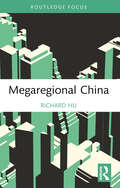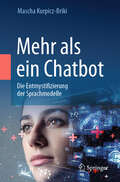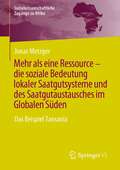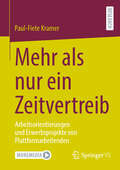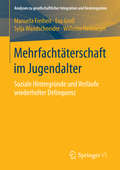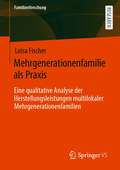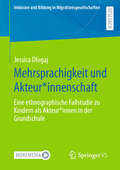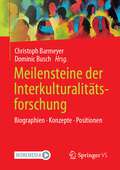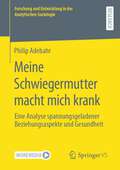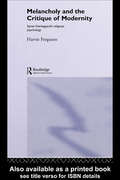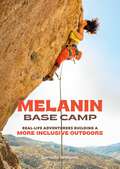- Table View
- List View
Mega-Event-Macher
by Gregor Betz Arne Niederbacher Ronald Hitzler Gerd MöllIm Jahr 2010 fand im Ruhrgebiet das Kulturereignis Europas im frühen 21. Jahrhundert statt: die ,Kulturhauptstadt Europas RUHR.2010'. An dessen Planung und Durchführung war eine unüberschaubare Zahl von Akteuren über einen langen Zeitraum hinweg zu unterschiedlichen Zeiten an unterschiedlichen Orten in mannigfaltigen Konstellationen beteiligt, die dabei mit multiplen Taktiken und Strategien (zumindest auch) ihre Sonder- und Eigeninteressen verfolgten. Das zentrale Erkenntnisinteresse der hier vorgelegten ethnografischen Studie lautet, wie dieses hochkomplexe Ereignis so organisiert werden konnte, dass es am Ende doch ,klappte'. Genauer gefragt: Welche Handlungsprobleme wurden dabei insbesondere von den Mitarbeitern der zum Zweck des ,Mega-Event-Machens' gegründeten Sonderorganisation auf Zeit - der RUHR.2010 GmbH - wie bewältigt?
Mega-Events and Mega-Ambitions: South Korea’s Rise and the Strategic Use of the Big Four Events (Mega Event Planning)
by Yu-Min Joo Yooil Bae Eva Kassens-NoorThis book provides a holistic analysis of South Korea’s strategic use of mega-events in its modern development. It examines the Summer Olympics (1988), the World Expo (1993), the FIFA World Cup (2002), and the Winter Olympics (2018) over the past 30 years of the country’s rapid growth, and across varying stages of economic and political development. It explains how mega-events helped to secure South Korea’s position on the international stage, boost nationalism, propel economic growth in export-oriented national companies, and build cities that accommodate – as well as represent – South Korea’s progress. It thereby highlights the broader implications for today’s global phenomenon of increasing reliance on mega-events as a catalyst for development, while the criticism that mega-events do more harm than good proliferates. The book is ideal for academics, policymakers, and those with an interest in mega-events and their role in the development of non-western countries.
Mega-Events as Economies of the Imagination: Creating Atmospheres for Rio 2016 and Tokyo 2020 (Routledge Advances in Sociology)
by Rodanthi TzanelliAtmosphere, the elusive ambiance of a place, enables or hinders its mobility in global consumption contexts. Atmosphere connects to social imaginaries, utopian representational frames producing the culture of a city or country. But who resolves atmospheric contradictions in a place’s social and cultural rhythms, when the eyes of the world are turned on it? Mega-Events as Economies of the Imagination examines ephemeral and solidified atmospheres in the Rio 2016 Olympic Games and the handover ceremony to Tokyo for the 2020 Games. Indeed, highlighting the various social and cultural implications upon these Olympic Games hosts, Tzanelli argues that the ‘Olympic City’ is produced by aesthetic "imagineers", mobile groups of architects, artists and entrepreneurs, who aesthetically ‘engineer’ native cultures as utopias. Thus, it is explored as to how Rio and Tokyo’s "imagineers" problematize notions of creativity, cosmopolitan togetherness and belonging. Mega-Events as Economies of the Imagination will appeal to postgraduate students, postdoctoral researchers and professionals interested in fields such as: Globalization Studies, Mobility Theory, Cultural Sociology, International Political Economy, Conference and Event Management, Tourism Studies and Migration Studies.
Megachurch Christianity Reconsidered: Millennials and Social Change in African Perspective (Missiological Engagements)
by Wanjiru M. GitauChristianity TodayMegachurch Christianity Reconsidered
Megacity Mobility Culture: How Cities Move on in a Diverse World
by Institute for Mobility ResearchWhat determines how cities move on? The ever-increasing challenges to urban mobility come in many forms, and approaches to address them range from the technically ingenious to attempts to change travel behaviour. Key amongst factors essential to the success of any such approach is whether the urban environment proves to be fertile ground for the desired progress. Another vital determinant of success is how well individual measures to engineer the transport system interact with other developments. This leads to the principal subject of Megacity Mobility Culture: the basic principles that determine the paths along which cities move. This book demonstrates that the concept of 'mobility culture' provides a framework for understanding the development of urban transport which transcends the boundaries between academic disciplines. Based on a discussion of the diversity of megacities worldwide, it provides help in navigating the complexity of megacity mobility culture. Experts from megacities around the world each take the reader on a journey to their own city and its mobility culture, giving a deeper insight into the unique evolutionary paths of mobility that these places have taken, and what lies before them. Whilst acknowledging the overwhelming diversity of cities worldwide, the authors also identify common denominators behind the evolution of urban transport systems - seven temperaments which are found in a unique mix in any given city, defining the character of its mobility culture. The Institute for Mobility Research is a research facility of the BMW Group. It deals with future developments and challenges relating to mobility across all modes of transport, with automobility being only one aspect among many. Taking on an international perspective, ifmo's activities focus on social science and sociopolitical, economic and ecological issues, but also extend to cultural questions related to the key challenges facing the future of mobility. The work of the Institute is supported by an interdisciplinary board of renowned scientists and scholars, and by representatives of BMW, Deutsche Bahn, Lufthansa, MAN, Siemens and The World Bank.
Megaevents and Modernity: Olympics and Expos in the Growth of Global Culture
by Maurice RocheThis analysis explores the social history and politics of mega-events from the late 19th century to the present. Through case studies of events such as the 1851 Crystal Palace Expo, the 1936 Berlin Olympics and the 1992 Barcelona Olympics, Maurice Roche investigates the impact Expos and Olympics have had on national identities, on the marking of public time and space, and on visions of national citizenship and international society in modern times. Historical chapters deal with the production of Expos by power elites, their impacts on mass culture, and the political uses and abuses of international sport and Olympic events. Chapters also deal with the impact of Olympics on cities, the growth of Olympics as media events and the current crisis of the Olympic movement in world politics and culture.
Meganet: How The Global Communications Network Will Connect Everyone On Earth
by Wilson P Dizard JrSo Paulo, Brazils largest city, has more mobile phones than does Paris. The largest phone system in Kampuchea is cellular. In the next twenty years, within one generation, everyone on earth will be able to place a phone call to anyone else anywhere. This Meganet is a patchwork of networks, big and small, local and global, primitive and high-tech, that fit together because they share compatible technologies. Wilson Dizards Meganet is a report on the progress and setbacks in expanding Meganet resources to everyone on earth. He examines not only the advantages, from toll-free numbers and credit cards, but the downsides, from the potential invasions of privacy to the question of who will and who should control Meganet. Dizard describes the likely players: from the oil and utility companies who own desirable rights-of-way to Silicon Valley to emerging innovators in Chile and Germany.
Meganets: How Digital Forces Beyond Our Control Commandeer Our Daily Lives and Inner Realities
by David B. AuerbachHow the autonomous digital forces jolting our lives – as uncontrollable as the weather and plate tectonics – are transforming life, society, culture, and politics.David Auerbach&’s exploration of the phenomenon he has identified as the meganet begins with a simple, startling revelation: There is no hand on the tiller of some of the largest global digital forces that influence our daily lives: from corporate sites such as Facebook, Amazon, Google, YouTube, Instagram, and Reddit to the burgeoning metaverse encompassing cryptocurrencies and online gaming to government systems such as China&’s Social Credit System and India&’s Aadhaar.As we increasingly integrate our society, culture and politics within a hyper-networked fabric, Auerbach explains how the interactions of billions of people with unfathomably large online networks have produced a new sort of beast: ever-changing systems that operate beyond the control of the individuals, companies, and governments that created them.Meganets, Auerbach explains, have a life of their own, actively resisting attempts to control them as they accumulate data and produce spontaneous, unexpected social groups and uprisings that could not have even existed twenty years ago. And they constantly modify themselves in response to user behavior, resulting in collectively authored algorithms none of us intend or control. These enormous invisible organisms exerting great force on our lives are the new minds of the world, increasingly commandeering our daily lives and inner realities.Auerbach&’s analysis of these gargantuan opaque digital forces yield important insights such as:The conventional wisdom that the Googles and Facebook of this world are tightly run algorithmic entities is a myth. No one is really in control.The efforts at reform - to get lies and misinformation off meganets - run into a brick wall because the companies and executives who run them are trapped by the persistent, evolving, and opaque systems they have created.Bitcoin and other cryptocurrencies are uncontrollable and their embrace by elite financial institutions threatens the entire economyWe are asking the wrong questions in assuming that if only the Facebooks of this world could be better regulated or broken up that they would be better, more ethical citizens.Why questions such as making algorithms fair and bias-free and whether AI can be a tool for good or evil are wrong and misinformedAuerbach then comes full circle, showing that while we cannot ultimately control meganets we can tame them through the counterintuitive measures he describes in detail.
Megaproject Management: A Multidisciplinary Approach to Embrace Complexity and Sustainability (SpringerBriefs in Applied Sciences and Technology)
by Franca Cantoni Edoardo FavariThe book investigates the various aspects characterizing Megaprojects from numerous perspectives and by integrating different disciplines: engineering, economics, business organization, human resource management, law, etc. It represents the first output of MeRIT (the Megaproject Research Interdisciplinary Team), and focuses on the intrinsic and unavoidable complexity of Megaprojects. The chapters have intentionally not been standardized, and humanistic topics are not separated from technical ones: this way of reading and interpreting Megaprojects through the cross-pollination of various disciplines reflects the MeRIT approach. Addressing the complexity involved in Megaprojects requires the use of a hermeneutic circle of sorts: understanding the project as a whole is achieved by referring to the specific parts, while each part can only be understood in relation to the whole. This circular approach appears to be the only one applicable to Megaprojects: no final destination, no final synthesis can be achieved. This volume consists of eight chapters written by researchers in law, economics, sociology, business organization, engineering, architecture and landscaping. The topics covered will be relevant to researchers, practitioners involved in the development of Megaprojects, and policymakers at the EU level.
Megaregional China (Routledge Research in Sustainable Planning and Development in Asia)
by Richard HuThis book unravels China’s new megaregional structure, new megaregional planning and development, new megaregional governance, and new regional planning system. It draws upon a diversity of megaregional cases: city clusters of the Beijing–Tianjin–Hebei region, Yangtze River delta region, and Greater Bay Area; and metropolitan circles of Chengdu, Hangzhou, Hong Kong, Shanghai, Shenzhen, and Zhengzhou.Megaregions are the new form of Chinese-style urbanisation. China’s new discourse of ‘high-quality development’ and ‘new-type urbanisation’ is reshaping its megaregional strategy. Imbalance and fragmentation characterise the diversity of megaregions - developed or developing, coastal or inland. The central goal of megaregional planning and governance is to achieve integrated, balanced development of them. Hu challenges the official notion of ‘top-level design’ that dominates the planning, governance, and development of China’s megaregions. Instead, he argues for the importance of engaging nongovernmental stakeholders, rebalancing the government-market relationality, encouraging bottom-up initiatives, and enabling grassroots ingenuity.The volume offers the first and most comprehensive study of megaregional China in the new contexts of both national development and urban development. It will be of interest to anyone looking into urban and regional development, and Chinese studies.
Mehr SMART als PHONE - fokussiert und inspiriert arbeiten (essentials)
by Michael Krebs Christine KuhnDie Digitalisierung bietet enorme Möglichkeiten, führt jedoch zunehmend zu einer Aufmerksamkeitskrise mit ständiger Ablenkung durch z.B. Social Media, Chat, E-Mail etc. – mit negativen Folgen für Produktivität und Wohlbefinden. Dieses Buch zeigt auf, wie bewusste Verhaltensreflexion, Mindfulness und Deep Work helfen, fokussierter und wirksamer zu arbeiten. Basierend auf wissenschaftlichen Erkenntnissen bietet es ein praxiserprobtes Action-Learning-Programm in sechs Schritten. Für alle, die ihre digitale Selbststeuerung stärken und mit mehr Klarheit durch den Arbeitsalltag gehen möchten.
Mehr als ein Chatbot: Die Entmystifizierung der Sprachmodelle
by Mascha Kurpicz-BrikiSie haben sich gefragt, wie Tools wie ChatGPT oder Bard funktionieren, haben aber keinen technischen Hintergrund? Dann ist dies das richtige Buch für Sie! Um besser zu verstehen, wozu solche Technologien in der Lage sind und wie sich dies auf unser Leben und unsere Gesellschaft auswirken wird, ist ein grundlegendes Hintergrundwissen über diese Technologie erforderlich. In diesem Buch werden insbesondere die folgenden Fragen thematisiert: Was hat die unglaublichen Fortschritte der letzten Zeit ermöglicht? Können Chatbots wie ChatGPT oder Bard Menschen wirklich verstehen? Welche Fallstricke gibt es und wie spiegeln sich die Stereotypen der Gesellschaft in solchen Modellen wider? Welches Potenzial steckt in dieser Technologie und wie wird die digitale Gesellschaft der Zukunft in Bezug auf die Mensch-Chatbot-Zusammenarbeit aussehen? Nach der Lektüre dieses Buches sind Sie sich der Risiken und Fallstricke bewusst, die diese Technologien mit sich bringen können, und wissen, wie Sie verantwortungsbewusst mit Werkzeugen umgehen, die auf KI-Technologie basieren.
Mehr als eine Ressource - die soziale Bedeutung lokaler Saatgutsysteme und des Saatgutaustausches im Globalen Süden: Das Beispiel Tansania (Sozialwissenschaftliche Zugänge zu Afrika)
by Jonas MetzgerSaatgut steht im Zentrum eines Transformationsprozesses, der weltweit mehr als zwei Milliarden Menschen betrifft. In dieser Studie über Kleinbäuerinnen und Kleinbauern in Tansania wird untersucht, wie lokale Saatgutsysteme in den soziokulturellen Strukturen kleinbäuerlicher Lebenswelten verankert sind. Am Beispiel des Saatguts wird damit die enge Verwobenheit landwirtschaftlicher und sozialer Praxis nachgezeichnet und es wird herausgearbeitet, wie einzelne von außen herangetragene Modernisierungsprozesse weitreichende Konsequenzen für das kleinbäuerliche Zusammenleben nach sich ziehen. Die Studie liefert eine konkrete, detaillierte und differenzierende Darstellung des bäuerlichen Alltags sowie über den Umgang der kleinbäuerlichen Haushalte mit Saatgut. Ein besonderer Fokus liegt dabei auf den Saatgutaustauschbeziehungen und wie diese in der Untersuchungsregion sowohl soziale Sicherheit als auch gesellschaftliche Kohäsion stiften. Die Studie basiert auf umfangreicher Feldforschung und intensiven Gesprächen mit Bäuerinnen und Bauern, die in der Arbeit auch selbst zu Wort kommen.
Mehr als nur ein Zeitvertreib: Arbeitsorientierungen und Erwerbsprojekte von Plattformarbeitenden
by Paul-Fiete KramerPlattformarbeit wird nicht zuletzt aufgrund der oft prekären Erwerbsbedingungen nur der Stellenwert eines (zeitweisen) Nebenerwerbs oder eines bezahlten Hobbys zugesprochen. Gleichzeitig zeichnen sich auf Seiten der Plattformarbeitenden vielfältige Interessenlagen und Erwerbskonstellationen ab, die über derartige Motive und Funktionen der Plattformarbeit hinausweisen. Die vorliegende Studie fragt ausgehend davon nach den längerfristigen erwerbsbezogenen Interessen und Strategien von Plattformarbeitenden und untersucht deren individuelle Ausgestaltung der Erwerbsprojekte. Die Untersuchung zeigt, dass Plattformarbeit teils langfristiger Bestandteil solo-selbstständiger Erwerbsprojekte ist und die Umsetzung individueller arbeitsbezogener Ansprüche ermöglicht; prekäre Erwerbsbedingungen werden dabei teils bewusst in Kauf genommen.
Mehrfachtäterschaft im Jugendalter: Soziale Hintergründe und Verläufe wiederholter Delinquenz (Analysen zu gesellschaftlicher Integration und Desintegration)
by Wilhelm Heitmeyer Manuela Freiheit Eva Groß Sylja WandschneiderDie Studie befasst sich auf breiter empirischer Basis mit den vielfältigen Lebenswelten und -realitäten junger Menschen und beleuchtet differenziert die möglichen Zusammenhänge wiederholter Jugenddelinquenz.
Mehrgenerationenfamilie als Praxis: Eine qualitative Analyse der Herstellungsleistungen multilokaler Mehrgenerationenfamilien (Familienforschung)
by Luisa FischerFamilie konstituiert sich als Praxis über mehrere familiale Generationen hinweg. Die Herstellungsleistungen multilokaler Mehrgenerationenfamilien werden differenziert und anschaulich erhoben sowie in ihrer eigenen Logik verständlich gemacht. Fokussiert wird beispielhaft auf die Beteiligung der Großeltern am Vereinbarkeitsarrangement junger Eltern. Es erweist sich als ertragreich, Familie in ihren mehrgenerationalen Bezügen in den familiensoziologischen und familienpolitischen Blick zu nehmen.
Mehrsprachigkeit und Akteur*innenschaft: Eine ethnographische Fallstudie zu Kindern als Akteur*innen in der Grundschule (Inklusion und Bildung in Migrationsgesellschaften)
by Jessica DlugajAusgehend von dem Befund, dass migrationsbedingte Mehrsprachigkeit zwar ein zentrales Thema der Erziehungswissenschaft darstellt, aber gleichzeitig wenig über die konkrete sprachliche Praxis mehrsprachiger Kinder in der Schule bekannt ist, widmet sich diese Fallstudie den sprachlichen Praktiken und Aushandlungen von Kindern an einer Grundschule. Dabei wird auf Basis einer ethnographischen Herangehensweise und unter Hinzunahme eines praxistheoretischen Agency-Konzeptes gezeigt, unter welchen Bedingungen es zur sprachlichen Handlungsfähigkeit von Kindern kommt und wie differenziert sich die mehrsprachige Situation von Kindern im Kontext von Migration im Feld Schule gestaltet.
Meilensteine der Interkulturalitätsforschung: Biographien. Konzepte. Positionen
by Christoph Barmeyer Dominic BuschInterkulturalität betrifft den gegenseitigen Verständigungsprozess von Personen, die verschiedenen Kulturen zugehörig sind und insofern nicht über dieselben Wertorientierungen, Bedeutungssysteme und Wissensbestände verfügen. Interkulturalität betrifft in jüngster Zeit immer mehr Menschen, sei es außerhalb oder innerhalb der eigenen Lebenswelten. Im Rahmen interkultureller Kontakte erfahren Personen nicht nur Ähnlichkeiten und Gemeinsamkeiten, sondern auch Unterschiede und Irritationen, die verstanden werden wollen. Aus diesem Grund hat die Forschung und Praxis zur Interkulturellen Kommunikation in den letzten Jahrzehnten – ausgehend von den USA – weltweit zunehmende Bedeutung und dynamische Entwicklung erfahren.Dieser Sammelband bietet einen innovativen und originellen Zugang zur Interkulturalitätsforschung: Im Mittelpunkt stehen für die Forschung bedeutende Personen, „Interkulturalisten“, die zentrale Theorien, Modelle und Konzepte erarbeitet und somit das Fach maßgebend geprägt haben. Es werden Zusammenhänge zwischen Interkulturalisten und bestimmten Themen, Theorien, Wissenschaftsdisziplinen und „Schulen“ hergestellt. Ebenso wird gezeigt, wie diese konzeptuellen Bezugsrahmen nutzbar sind, um die „interkulturelle Wirklichkeit“ besser zu verstehen.
Mein erfolgreiches Orchester: Techniken und Strategien für Zusammenarbeit und Entwicklung im Orchester
by Armin WunschDas Buch fokussiert die vielfältigen Aspekte des Berufslebens im Orchester jenseits der musikalisch-künstlerischen Arbeit. Das Ziel ist die Begleitung und Unterstützung von Musiker*innen bei beruflichen Alltagsthemen, Krisen und Konflikten und bei ihrer persönlichen Entwicklung. Konzerte künstlerisch zu erarbeiten und vor Publikum zu präsentieren, erfordert von Musiker*innen immer wieder körperliche, mentale und kommunikative Höchstleistungen. Ein ganzes Berufsleben lang diesem Erfolgsdruck standzuhalten und das persönliche Spielniveau zu halten, bedeutet eine große Herausforderung.Aus einer langjährigen Berufserfahrung heraus, zunächst aus Perspektive eines Musikers im Orchester und dann der des Orchestermanagements, gelingt es dem Autor, die persönlichen Fragestellungen und die Themen des Kollektivs prägnant zu beschreiben, einzuschätzen und persönliche Entwicklungsmöglichkeiten im Orchester mit Techniken der Transaktionsanalyse zu fördern.Darüber hinaus bietet das Buch Anregung für Teamgestaltung und Teamentwicklung allgemein.
Meine Schwiegermutter macht mich krank: Eine Analyse spannungsgeladener Beziehungsaspekte und Gesundheit (Forschung und Entwicklung in der Analytischen Soziologie)
by Philip AdebahrDie Arbeit befasst sich mit dem Zusammenhang von verschiedenen negativen Beziehungsaspekten bzw. spannungsgeladenen Interaktionsketten und subjektiver Gesundheit. Mit Daten aus der Mixed Methods Studie 'Gesichter der Armut' werden auf Basis fallimmanenter Dyadenportraits zunächst Idealtypen negativer Beziehungsaspekte herausgearbeitet. Die sprichwörtlich 'böse Schwiegermutter' entspricht dabei dem Typ 'Manipulativ'. Darauf aufbauend werden die Idealtypen in ein Messinstrument überführt. Auf Grundlage einer Random-Route-Stichprobe wurden in einer eigenen Studie egozentrierte Netzwerke erhoben und das Messinstrument mittels Faktorenanalyse quantitativ überprüft. Abschließend erfolgt die Analyse der Assoziation zwischen negativen Beziehungsaspekten und subjektiver Gesundheit mittels linearer Regressionsmodelle. Der Zusammenhang zwischen negativen Beziehungsaspekten und subjektiver mentaler Gesundheit erweist sich als frauenspezifisch und ist unabhängig vom Typ negativer Beziehungsaspekte. Es ist also weniger wichtig, ob es sich um die 'böse Schwiegermutter' oder den 'nervigen Nachbarn' handelt.
Melancholy and the Critique of Modernity: Soren Kierkegaard's Religious Psychology
by Harvie FergusonThe connections between the emergence of modern society and the experience of melancholy are explored through a comprehensive re-examination of Soren Kierkegaard's rich and insightful writings.
Melancholy, Love, and Time: Boundaries of the Self in Ancient Literature
by Peter TooheyAncient literature features many powerful narratives of madness, depression, melancholy, lovesickness, simple boredom, and the effects of such psychological states upon individual sufferers. Peter Toohey turns his attention to representations of these emotional states in the Classical, Hellenistic, and especially the Roman imperial periods in a study that illuminates the cultural and aesthetic significance of this emotionally charged literature. His probing analysis shows that a shifting representation of these afflicted states, and the concomitant sense of isolation from one's social affinities and surroundings, manifests a developing sense of the self and self-consciousness in the ancient world. This book makes important contributions to a variety of disciplines including classical studies, comparative literature, literary and art history, history of medicine, history of emotions, psychiatry, and psychology.
Melanin Base Camp: Real-Life Adventurers Building a More Inclusive Outdoors
by Danielle WilliamsBeautiful, empowering, and exhilarating, Melanin Base Camp is a celebration of underrepresented BIPOC adventurers that will challenge you to rethink your perceptions of what an outdoorsy individual looks like and inspire you to being your own adventure. Danielle Williams, skydiver and founder of the online community Melanin Base Camp, profiles dozens of adventurers pushing the boundaries of inclusion and equity in the outdoors. These compelling narratives include a mother whose love of hiking led her to found a nonprofit to expose BIPOC children to the wonders of the outdoors and a mountain biker who, despite at first dealing with unwelcome glances and hostility on trails, went on to become a blogger who writes about justice and diversity in natural spaces. Also included is a guide to outdoor allyship that explores sometimes challenging topics to help all of us create a more inclusive community, whether you bike, climb, hike, or paddle. Join us as we work together to increase representation and opportunities for people of color in outdoor adventure sports.
Meltdown: Why Our Systems Fail and What We Can Do About It
by Chris Clearfield András TilcsikA groundbreaking take on how complexity causes failure in all kinds of modern systems—from social media to air travel—this practical and entertaining book reveals how we can prevent meltdowns in business and life.A crash on the Washington, D.C. metro system. An accidental overdose in a state-of-the-art hospital. An overcooked holiday meal. At first glance, these disasters seem to have little in common. But surprising new research shows that all these events—and the myriad failures that dominate headlines every day—share similar causes. By understanding what lies behind these failures, we can design better systems, make our teams more productive, and transform how we make decisions at work and at home. Weaving together cutting-edge social science with riveting stories that take us from the frontlines of the Volkswagen scandal to backstage at the Oscars, and from deep beneath the Gulf of Mexico to the top of Mount Everest, Chris Clearfield and András Tilcsik explain how the increasing complexity of our systems creates conditions ripe for failure and why our brains and teams can't keep up. They highlight the paradox of progress: Though modern systems have given us new capabilities, they've become vulnerable to surprising meltdowns—and even to corruption and misconduct. But Meltdown isn't just about failure; it's about solutions—whether you're managing a team or the chaos of your family's morning routine. It reveals why ugly designs make us safer, how a five-minute exercise can prevent billion-dollar catastrophes, why teams with fewer experts are better at managing risk, and why diversity is one of our best safeguards against failure. The result is an eye-opening, empowering, and entirely original book—one that will change the way you see our complex world and your own place in it.
Meltdown: Why Our Systems Fail and What We Can Do About It
by Chris Clearfield András TilcsikA groundbreaking take on how complexity causes failure in all kinds of modern systems--from social media to air travel--this practical and entertaining book reveals how we can prevent meltdowns in business and life"Endlessly fascinating, brimming with insight, and more fun than a book about failure has any right to be, Meltdown will transform how you think about the systems that govern our lives. This is a wonderful book."--Charles Duhigg, author of The Power of Habit and Smarter Faster BetterA crash on the Washington, D.C. metro system. An accidental overdose in a state-of-the-art hospital. An overcooked holiday meal. At first glance, these disasters seem to have little in common. But surprising new research shows that all these events--and the myriad failures that dominate headlines every day--share similar causes. By understanding what lies behind these failures, we can design better systems, make our teams more productive, and transform how we make decisions at work and at home.Weaving together cutting-edge social science with riveting stories that take us from the frontlines of the Volkswagen scandal to backstage at the Oscars, and from deep beneath the Gulf of Mexico to the top of Mount Everest, Chris Clearfield and András Tilcsik explain how the increasing complexity of our systems creates conditions ripe for failure and why our brains and teams can't keep up. They highlight the paradox of progress: Though modern systems have given us new capabilities, they've become vulnerable to surprising meltdowns--and even to corruption and misconduct.But Meltdown isn't just about failure; it's about solutions--whether you're managing a team or the chaos of your family's morning routine. It reveals why ugly designs make us safer, how a five-minute exercise can prevent billion-dollar catastrophes, why teams with fewer experts are better at managing risk, and why diversity is one of our best safeguards against failure. The result is an eye-opening, empowering, and entirely original book--one that will change the way you see our complex world and your own place in it.
